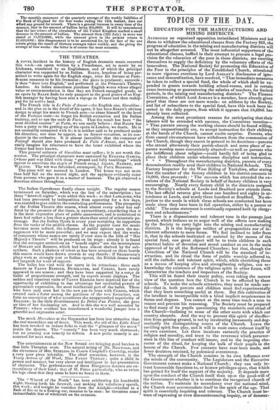THE THEATRES.
A NOVEL incident in the history of English dramatic music occurred this week—an opera written by a Frenchman, set to music by an Irishman, translated by an Englishman, and of which the principal character was supported by an Italian. BALFE, hopeless of being per- mitted to write again for the English stage, tries his fortune at Paris : SCRIBE consents to be his dramatist ; the piece is produced ; succeeds ; is then " done into English," and performed at the Princess's Theatre, London. As ladies sometimes purchase English wares whose alleged -value or recommendation is that they are French smuggled goods, so an opera by BALFE finds its only passport to the good graces of an Eng- lish manager by having been sent a voyage to France and then reship- ped for its native land. The French title is Le Puits d'Amour—the English one, Geraldine : and in the plan as in the detail of his opera, it has been BALFE'S obvious design to adapt his music to French ears—to abase himself to the level of the Parisian taste—to forget his British extraction and his Italian training, and to ape the mode de Pat-is. That the result has been "the most decided success" at Paris, we can easily believe : that BALFE has been a party to the getting-up of his opera in London, we doubt. He is not ostensibly connected with it ; it is neither said to be produced under his direction, nor does he appear, as on former occasions, as its con- ductor in the orchestra. It is almost incredible that the composer of Falstaff should also have produced Le Puits d'Amour, and we can easily imagine his reluctance to have the latter exhibited where the former had been known.
This general estimate of Geraldine must suffice; it is not worth dis- section. The principal characters were sustained by EUGENIA Gem's., (whose part was filled with those "ground and lofty turublings " which appear to constitute the stap!e of French song,) ALLEN, BARKER, and WALTON. The wit was furnished, extempore, by Penn BEDFORD.
The piece will not succeed in London. The house was not more than half full on the second night, and the applause evidently came from persons who gave it as a matter of business. The pit observed a decorous silence throughout.


























 Previous page
Previous page